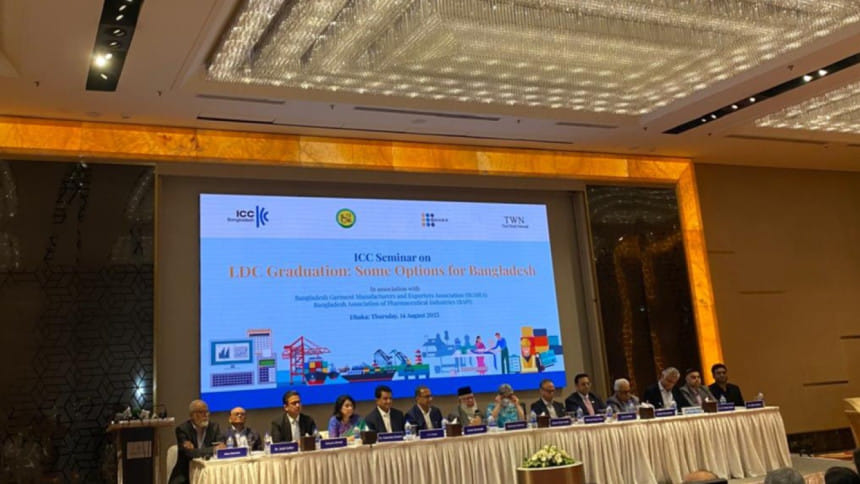Business leaders call for five-year extension of LDC graduation

Leaders of top businesses today urged the government for taking initiatives to extend the transition period for Bangladesh's graduation from the Least Developed Country (LDC) category.
At a seminar on "LDC Graduation: Some Options for Bangladesh," businesses demanded for a three- to five-year extension in the transition period so that they can take preparations to compete in the international market after the country's graduation from LDC.
The call comes as Bangladesh is scheduled to graduate to developing country from LDC status in November 2026.
Businesses also urged the government to negotiate better trade deals, including free trade agreements (FTAs) with the European Union, United Kingdom (UK), and major Asian economies, to maintain market access and avoid tariff shocks.
As part of preparations, the leaders recommended diversifying beyond garments by developing pharmaceuticals, IT services, agro-processing, leather, and light engineering to reduce over-dependence on a single sector.
They called for building human capital for the fourth industrial revolution, training a workforce skilled in automation, Artificial Intelligence, advanced manufacturing and strengthening institutions through transparent governance.
"Without these measures, graduation risks slowing down our economic momentum instead of accelerating it," said International Chamber of Commerce-Bangladesh (ICC-B) President Mahbubur Rahman at the event.
The ICC-B in association with the Bangladesh Garment Manufacturers and Exporters Association (BGMEA) and the Bangladesh Association of Pharmaceutical Industries (BAPI) organised the seminar at the Sheraton Dhaka.
"Today's question is not whether we graduate; that is settled. The challenge is how we graduate successfully," he said.
Sanya Reid Smith, legal advisor and senior researcher of The Third World Network (TWN), presented the keynote paper, noting that LDC graduation will result in the loss of duty-free access to key markets, with tariffs potentially rising to 12 per cent, reducing exports by 6-14 per cent unless GSP+ or similar arrangements are secured.
Participants said the impact would be felt across sectors, particularly pharmaceuticals, which currently meets 98 per cent of domestic demand and exports to over 150 destinations. This is because of the loss of the waiver from compliance with the WTO agreement on Trade-Related
Aspects of Intellectual Property Rights (TRIPS) after the graduation from the LDC category. Drug makers will have to comply with patent laws which will increase costs and require heavy investment in R&D and advanced technology.
Rahman said an extension of the transition period for graduation has become necessary amid political instability, high debt, and falling foreign direct investments.

 For all latest news, follow The Daily Star's Google News channel.
For all latest news, follow The Daily Star's Google News channel. 



Comments